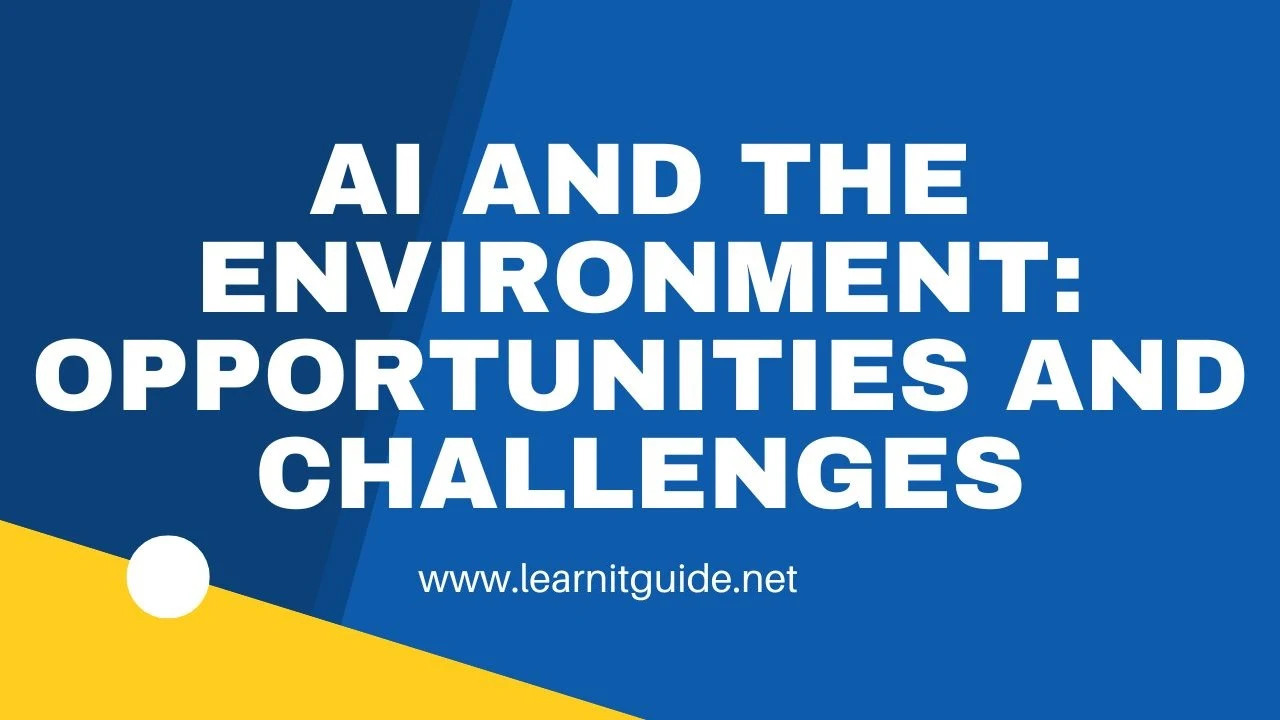This post will help you to understand about AI and the Environment: Opportunities and Challenges.
If you are interested in learning, Request you to go through the below recommended tutorial.
DevOps Full Course Tutorial for Beginners - DevOps Free Training OnlineDocker Full Course Tutorial for Beginners - Docker Free Training Online
Kubernetes Full Course Tutorial for Beginners - Kubernetes Free Training Online
Ansible Full Course Tutorial for Beginners - Ansible Free Training Online
Openstack Full Course Tutorial for Beginners - Openstack Free Training Online
Lets Get Started.
AI and the Environment: Opportunities and Challenges
Artificial intelligence (AI) has the potential to revolutionize many industries and have a significant impact on our daily lives. The environmental sector is no exception, and AI is increasingly being used to address some of the world's most pressing environmental problems. However, AI also presents new challenges for the environment that must be addressed. In this article, we will explore the opportunities and challenges posed by AI in the context of the environment.
Opportunities
Environmental Monitoring and Analysis
One of the most significant opportunities for AI in the environment is its ability to monitor and analyze large amounts of environmental data in real-time. For example, AI can be used to monitor and analyze data from sensors and other monitoring devices to detect changes in the environment and provide early warnings of potential environmental disasters. This can help prevent the spread of harmful chemicals and other pollutants, reduce waste, and conserve natural resources.
Predictive Maintenance and Optimization
AI can also be used to predict maintenance needs for industrial facilities and other critical infrastructure, such as water treatment plants, power plants, and pipelines. This can help to reduce waste and optimize resource use, leading to a more sustainable environment.
Climate Change Mitigation and Adaptation
AI can also play a critical role in mitigating and adapting to climate change by providing detailed and accurate data on the impacts of climate change, as well as predicting future trends. This information can be used to guide policy-making, investment, and other decisions that can help to mitigate the effects of climate change and promote sustainable development.
Renewable Energy Generation and Management
AI can also help to improve the efficiency and effectiveness of renewable energy systems, such as wind and solar power. For example, AI can be used to optimize energy generation and storage, improve energy distribution and management, and reduce the costs of renewable energy systems. This will help to promote the wider adoption of renewable energy and reduce greenhouse gas emissions.
Conservation and Biodiversity Protection
AI can also play a crucial role in conservation and biodiversity protection. For example, AI can be used to monitor and track wildlife populations, identify areas of critical habitat, and monitor the impacts of human activities on ecosystems. This information can be used to guide conservation efforts and promote sustainable development.
Challenges
Privacy and Data Security
One of the biggest challenges posed by AI in the environment is the issue of privacy and data security. Large amounts of environmental data are often collected and stored in centralized databases, making it vulnerable to cyberattacks, hacking, and other forms of unauthorized access. This could result in sensitive environmental information being compromised and used for malicious purposes.
Data Bias and Accuracy
Another challenge posed by AI in the environment is the issue of data bias and accuracy. The data used to train AI algorithms must be representative and free from bias in order to ensure that the results are accurate and trustworthy. However, the data used to train AI algorithms is often limited, leading to potential biases and errors in the results.
Ethical and Legal Implications
The use of AI in the environment also raises ethical and legal issues, such as the question of who is responsible for the decisions made by AI algorithms and the potential for AI algorithms to be used for unethical purposes. For example, AI algorithms could be used to make decisions about resource allocation that are not in the best interests of the environment.
Technical Challenges
Finally, there are also a number of technical challenges associated with the use of AI in the environment. For example, AI algorithms must be able to handle complex environmental data, such as images, videos, and other types of sensory information. They must also be able to work effectively in real-time and under conditions of limited data availability and connectivity.
Conclusion
In conclusion, AI presents both opportunities and challenges for the environment. AI can help to monitor and analyze environmental data, optimize resource use, mitigate the effects of climate change, promote renewable energy, and protect biodiversity. However, AI also poses new challenges, such as privacy and data security, data bias and accuracy, ethical and legal implications, and technical challenges. To fully realize the potential of AI in the environment, it is essential that we address these challenges and work to ensure that AI is used in a responsible, ethical, and sustainable manner.
That’s it for this post, Hope you have got an idea about AI and the Environment: Opportunities and Challenges.
You can also refer similar links below on Artificial Intelligence topics.
Artificial Intelligence and the Future of Work
The Future of AI and Its Effect on Society
AI and the Environment: Opportunities and Challenges
How AI is Changing the Landscape of Business and Marketing
AI in Education Enhancing Learning and Teaching
Keep practicing and have fun. Leave your comments if any.
Support Us: Share with your friends and groups.
Stay connected with us on social networking sites, Thank you.








0 Comments